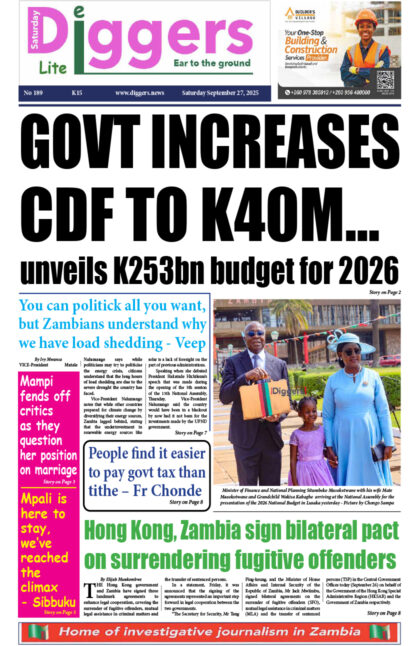ZESCO Limited’s failure to explain why it needs to acquire a €1.7 billion loan, translating to around K45 billion, remains suspicious, says Transparency International Zambia (TI-Z).
And former finance minister Dr Situmbeko Musokotwane says Zesco’s decision to acquire the unexplained €1.7 billion loan may cost Zambia’s chance for an International Monetary Fund (IMF) bailout package.
Last week, an investigation by News Diggers! indicated that Zesco was seeking an unprecedented €1.78 billion loan from suspicious unlicensed and unregulated lenders based in Bosnia, Italy and Thailand, and Zesco hadfailed to explain the purpose of the loan to-date.
Commenting on the development, TI-Z executive director Maurice Nyambe insisted that Zambians needed to be informed on the rationale and details of the loan.
“TI-Z is greatly concerned about the €1.7 billion loan that Zesco is allegedly seeking from some named unregulated lenders. This is because Zesco is a parastatal and thus, any borrowing on its account, especially under a sovereign guarantee, is likely to be transferred to the public debt stock, in the likely event of a failure to service the loan. Considering the huge debt stock that Zambia has, it is not prudent for Zesco to borrow on behalf of the Zambian people without following due process,” Nyambe said.
“The public should be informed of the rationale for the loan, a clear approval process should be followed and the source of the loan should be interrogated. A government should not operate in the black market since doing so compromises credit ratings and goes against sound economic management, transparency and accountability.”
He said Zesco, being a parastatal, had an obligation to be accountable to Zambians.
“It is highly suspicious! Given the strategic importance of Zesco to Zambia’s economy, the need for transparency and openness in the way it handles its affairs cannot be overemphasised. Being a key parastatal, Zesco has an obligation to be accountable to the Zambian people and we demand that they fulfill that obligation without fail,” said Nyambe.
“We advise the government to slow down on its apparent insatiable appetite to contract debt. Our fear is that with the 2021 elections on the horizon, government will be too keen to engage in short-term development projects aimed at impressing the electorate and may resort to acquisition of more loans to get this done. We urge government to avoid going down this path because the country is already in a precarious position with our current debt stock and any additions to it will spell more doom than we are already facing.”
And Dr Musokotwane, who is also Liuwa UPND member of parliament, said the failure to explain the need to acquire the loan would affect Zambia’s chances of finally attracting a much-needed economic bailout package from the IMF.
“This time, I can say any loan that a parastatal will get will have to be guaranteed by the government because the lenders out there know the situation in Zambia. So, any loan that anyone gets will have to be guaranteed by the government, which means that to the number that you know, what government owes, we must now add what is being proposed for borrowing. As far as those people, who are trying to see that they can help us in terms of debt relief, in terms of stretching the period of payment, reducing the amount we owe, they always ask themselves the question: ‘if we assist these people, will it do them any good?’ In other words, ‘is it going to help them?’ Helping them means coming out of the problem of serious indebtedness,” Dr Musokotwane said. “Now, when we are adding extra amounts, especially now that there is no explanation from Zesco on what the money is meant for, that, of course, will make it harder for us to please the old lenders that we need relief. Because they will say, ‘you are looking for relief from us, but you are still borrowing from us and we don’t even know what you are boring for.’ So this obviously is going to cause problems.”
He some similar concerns were likely to be raised by the IMF.
“The IMF will say, ‘you want to be assisted to come out of the debt crisis, but you are putting more debt.’ So, that will also cause delays in terms of how we can be assisted. We have been having rejections. You see, all these years, the IMF had been dragging their feet, they did not get the impression from government, but government was serious in terms of tackling the debt,” said Dr Musokotwane. “They didn’t get that impression, that is why they were always refusing. The IMF gave conditions and they want to hear from us what we are planning to do to come out from this crisis. Now while waiting for those details, in the meantime, Zesco is borrowing money from which it cannot explain and that money must be guaranteed by the Zambian government; that does not help us!”
























